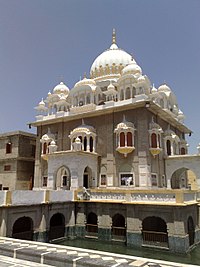Sikhism in Pakistan
 | |
| Total population | |
|---|---|
| 80,116 (2011) | |
| Regions with significant populations | |
| Lahore · Islamabad · Peshawar · Faisalabad · Karachi · Nankana Sahib · Hasan Abdal | |
| Languages | |
| Punjabi |
Sikhism in present-day Pakistan area has an extensive heritage and history, although Sikhs form a very small community in Pakistan today. Most Sikhs live in the province of Punjab, a part of the larger Punjab region where the religion originated in the Middle Ages and Peshawar, in the Khyber-Pakhtunkhwa province. Nankana Sahib, the birthplace of Guru Nanak Dev Ji, the founder of Sikhism, is located in the Punjab province.
In the 18th and 19th centuries, the Sikh community became a powerful political force, with Sikh leader Ranjit Singh founding the first Sikh empire, which had its capital in Lahore, the second-largest city in Pakistan today. Significant populations of Sikhs inhabited the largest cities in the Punjab such as Lahore, Rawalpindi and Faisalabad. After the independence of Pakistan in 1947, the minority Hindu and Sikh migrated to India while many Muslim refugees from India settled in Pakistan.
In the decades following Pakistan's independence in 1947, the Sikh community began to re-organise, forming the Pakistan Sikh Gurdwara Prabandhak Committee (PGPC) to represent the community and protect the holy sites and heritage of the Sikh religion in Pakistan. The Pakistani government has begun to allow Sikhs from India to make pilgrimages to Sikh places of worship in Pakistan and for Pakistani Sikhs to travel to India.
According to the estimates of United States Department of State in 2006, there were 20,000 Sikhs in Pakistan.[1]
Before the independence of India and Pakistan
 |
 |
Prior to the independence in 1947, Sikhs were spread all across Northern Pakistan, specifically the Punjab region and played an important role in its economy as farmers, businessmen, and traders. Lahore, the capital of Punjab was then and still is today the location of many important religious and historical sites for Sikhs, including the Samadhi of Ranjit Singh. The nearby town of Nankana Sahib has nine gurdwaras, and is the birthplace of Sikhism's founder, Guru Nanak Dev. Each of Nankana Sahib's gurdwaras are associated with different events in Guru Nanak Dev's life. The town remains an important site of pilgrimage for Sikhs worldwide.
Independence of Pakistan (1947)

Nationwide, there are no reliable numerical figures for Sikhs in the country. Estimates vary, the US Department of State estimated in 2007 that there were about 20,000.[2] The largest Sikh population in Pakistan is found in Peshawar, in the Khyber-Pakhtunkhwa, where the Pashtun law of "nanawati" (protection) spared the scale of violence which had raged across the Indus River in Punjab. Despite the longstanding tensions between the Sikh and Muslim communities in South Asia, the Pashtuns were tolerant towards the religious minority of Sikhs. [3] There are small pockets of Sikhs in Lahore and Nankana Sahib in Punjab. The Sikhs and Hindus of West Punjab and Sindh provinces of Pakistan migrated to India after the independence of Pakistan in 1947. These Sikhs and Hindus refugee communities have had a major influence in the culture and economics of the Indian capital city of Delhi. Today, segments of the populations of East Punjab and Haryana states and Delhi in India can trace their ancestry back to towns and villages now in Pakistan, including former Indian Prime Minister Manmohan Singh.[4][5]
There has been an influx of Sikhs refugees from Afghanistan in Pakistan due to the turbulent civil war and conflicts that have ravaged neighboring Afghanistan. [6] Afghanistan, like Pakistan, has had very small Sikh and Hindu populations. There has been a massive exodus of refugees from Afghanistan into Pakistan during the past 30 years of turmoil up to the reign of the Taliban and the subsequent US invasion of Afghanistan in late 2001. Due to Pakistan's porous borders with Afghanistan, large numbers of Afghanistan's minority communities, based mainly around the cities of Kabul, Kandahar, and Jalalabad have fled, and some Sikhs have joined their kinsmen in Peshawar and Lahore.[7][8]
The Pakistani Sikh community in modern times

Until today, Sikh have mainly kept a low profile within the monolithic Muslim population of Pakistan.[9] Though, Pakistan maintains the title of Islamic state, the articles twenty, twenty-one and twenty-two in chapter two of its constitution guarantees religious freedom to the non-Muslim residents.[10] Since independence in 1947, relations between Pakistan's minorities and the Muslim majority have remained fairly and politically stable. From 1984 to 2002, Pakistan held a system of separate electorates for all its national legislative assemblies, with only a handful of parliamentary seats reserved for minority members. Minorities were legally only permitted to vote for designated minority candidates in general elections. The regime of former President General Pervez Musharraf had professed an agenda of equality for minorities and promotion and protection of minority rights, however, the implementation of corrective measures has been slow. Considerable amount of Sikhs are found in neighbourhood called Narayanpura of Karachi's Ranchore Lines.[11][12]
The historical and holy sites of Sikhs are maintained by a Pakistani governmental body, the Pakistan Sikh Gurdwara Prabandhak Committee, which is responsible for their upkeep and preservation.
The emergence of the Sikh community within Pakistan
After the independence of Pakistan and the migration of nearly all Sikhs to India the Sikh community's rights were diminished as their population decreased.[13] The Pakistani Constitution states that Sikhism is a monotheistic religion. Recently the Sikh community within Pakistan has been making every effort possible to progress in Pakistan. For example, Harcharan Singh became the first Sikh to join the Pakistan Army. For the first time in the 58-year history of Pakistan there has a Sikh been selected into Pakistan's army. Prior to Harcharan Singh's selection in the Pakistani army no individual person who was a member of the Hindu or the Sikh community were ever enrolled in the army, however; the Pakistani Christian community has prominently served in the Pakistan Armed Forces and some had even reached into to the ranks of Major Generals in the army, Air Vice Marshals in the Pakistan Air force and rear Admiral in the Pakistan Navy. It has received various awards for gallantry and valor. Moreover, members of the tiny Parsi community have some representation in the Armed Forces.[14] First time in the history of Pakistan as well as in the history of Lahore a Sikh person has been appointed as a traffic Sub Inspector. Dr. Gulab Singh who is just 25 years old, is a practising homeopathic doctor and he is from the same place as Harcharan Singh (Nankana Sahib). Gulab Singh is fluent in Urdu, Punjabi, Pashto, Saraiki, Sindhi, and little bit of English.[15] Other prominent Sikhs are Inspector Amarjeet Singh of Pakistan Rangers and Lance-naik Behram Singh of Pakistan Coast Guard.[16]


In yet another contribution to the Pakistani Sikh community, Pakistan Government enacted the Sikh marriage act, Anand Marriage act, in November 2007. This Sikh marriage act allows not only the Sikhs in Pakistan, but also Sikhs living in anywhere in the world to register in Pakistan with the Sikh marriage act.[17][18] Many pilgrim Sikhs couples from abroad have reaffirmed their marriage vows in Pakistan under the Sikh marriage act.
Ramesh Singh Arora became the first Sikh member of Provincial Assembly of the Punjab of Pakistan after he was nominated by the Pakistan Muslim League (N) (PML (N)).[19] Another Sikh, Dr. Suran Singh has been nominated to the Khyber Pakhtunkhwa Assembly by the Pakistan Tehreek-e-Insaf following the 2013 elections.[20]
The first Pakistani Sikh musician also emerged on the music industry in 2009, Jassi Lailpuria, launched his first song on independence day entitled, Sohna Pakistan.[21] A Sikh named Taranjeet Singh is an VJ, anchor and host on PTV channel.[22][23]
Rupinder Singh Magon (Rup Magon) from the band Josh is also a superstar in Pakistan and is very popular among the youth of the country although he lives in Canada but travels to Pakistan a lot for Concerts and TV engagements. He, along with his band mate Qurram Hussain, was part of Coke Studio as well, which is a big achievement.
Pakistani Sikh diaspora
Some Pakistani Sikhs have migrated abroad to countries like the United Kingdom and Canada. There is also a growing Pakistani Sikh community in Dubai. In the United Kingdom there are only a few hundred Pakistani Sikhs, 346 according to the 2001 census.[24]
Gurdwaras
See also
- Maharaja Ranjit Singh (Punjab)
- Pakistan Sikh Council
- Pakistan Sikh Gurdwara Prabandhak Committee
- Dr. Suran Singh
- Ramesh Singh Arora
- History of Sikhism
- Anand Karaj
- Ganga Sagar (urn)
References
- ^ Pakistan International Religious Freedom Report 2006
- ^ "Pakistan". State.gov. Retrieved 13 August 2010.
- ^ India Uncut, India "Jaziya" 4 October 2006
- ^ "The villagers are proud of the link between Gah and the prime minister of India".
- ^ "Singh's ancestral village, Gah, is located 25 kilometres west of Chakwal city and attracted journalists like moths to a flame following the former PM's rise to power".
- ^ , "The Heart-rending Story of Afghani Sikhs" 4 October 2006
- ^ "Many of the Sikhs displaced from the Tirah Valley have adopted Pashtun traditions and culture".
- ^ "25,000 Sikhs in the province – mostly in Buner, Swat, DI Khan, Bara, Khyber, Kurram and Orakzai agencies".
- ^ Tribune, India "Maryada may be in danger, but Sikhs are special in Pakistan" 4 October 2006
- ^ "[Chapter 1: Fundamental Rights] of [Part II: Fundamental Rights and Principles of Policy]". Pakistani.org. Retrieved 13 August 2010.
- ^ "Sikhs of Narayanpura welcoming people from all walks of life to attend their celebrations such as Joti-Jot and the birth anniversary of Baba Guru Nanak".
- ^ "Ranchore Line's Narayanpura, an area where the Sikhs and the Hindus live together".
- ^ "Partition Of The Punjab - 1947" 12 November 2006
- ^ "First Sikh officer in Pakistan Army" 20 December 2005
- ^ "Sikh appointed Sub Inspector in Pakistan" 27 April 2007
- ^ "Prominent Sikhs within Pakistan, those who have crossed difficult barriers to succeed in their life and careers".
- ^ "Pakistan passes Anand Karaj".
- ^ "Pakistan Minister gives assurances for enacting Sikh Marriage Act" 24 November 2007
- ^ [1]
- ^ "Suran Singh, minister of Minorities for the province and a member of the ruling PTI".
- ^ "". "Sohna Pakistan by Jassi Lailpura". Youtube.com. Retrieved 2 January 2011.
{{cite web}}:|author=has numeric name (help) [unreliable source?] - ^ "The ceremony also featured a concert and speeches from at least 10 "youth icons", PTV host Taranjeet Singh".
- ^ "Taranjeet Singh from PTV shared their experiences with the youth".
- ^ "Ethnic group by religion, April 2001: Census update". Statistics.gov.uk. Retrieved 13 August 2010.
External links
- Muslim leaders condemn brutal killing of Sikhs by Taliban in Pakistan. TCN News.
- "Pakistan: Insufficient protection of religious minorities". Amnesty International. 14 May 2001. Retrieved 13 August 2010.
- Frei, Matt (13 January 2002). "Time stands still at Khyber Pass". British Broadcasting Corporation. Retrieved 13 August 2010.
- Jolly, Asit (11 October 2001). "Sikh Families Escape Afghanistan". British Broadcasting Corporation. Retrieved 13 August 2010.
- Rana, Yudhvir. "NWFP Sikhs sore over denial of visas to India". The Times Of India. Retrieved 13 August 2010.
